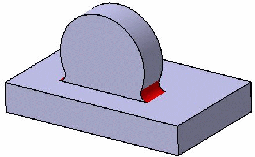About Recognizing Fillets, Chamfers and Holes Automatically | ||||
|
| |||
Canceling Recognition
If needed, you can stop the operation by clicking the Cancel button.
- If you do that before even a single feature is recognized, then the message 'Feature recognition canceled. No feature was recognized.' is displayed. The document is then in the state it was in, when you had fired the command; except that if the In Work Object was set to an isolated solid by the Feature Recognition command, then this change remains. You can use Undo to get back to the previous state.
- If some features are recognized before pushing the Cancel
button, a dialog box displays asking you if you accept to create the
features recognized till then.
- If you click Yes then the recognized features are created, the progress bar continues to show progress of the process, but then you are not be able to cancel it again.
- If you click NO then again the document will be in the state that it was in, when you had launched the command; except that if the In Work Object was set to an isolated solid by the command, then this change will remain. You can use Undo to get back to the previous state.
More About Automatic Recognition of Fillets and Chamfers
In some simple cases,
the automatic recognition of fillets or chamfers fail. This is due to the
fact that Automatic Feature Recognition
![]() is closely related to geometric properties such as angularity, proportion
(in case of chamfers) etc.
is closely related to geometric properties such as angularity, proportion
(in case of chamfers) etc.
In the example below, the red colored fillet cannot be recognized automatically
because the angle value is too small. The work around to solve this case,
is to use the Manual Feature Recognition command
![]() .
.

More about Recognizing Complex Holes
If you want to recognize
complex holes (holes more complex than countersunk ,
counterbored , or counterdrilled
holes), we recommend you use the Manual Feature Recognition command
![]() ,
instead of Automatic Feature Recognition
,
instead of Automatic Feature Recognition
![]() .
This avoids solving ambiguous cases. For more information, see Recognizing Complex Holes.
.
This avoids solving ambiguous cases. For more information, see Recognizing Complex Holes.